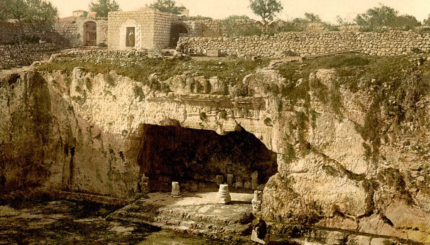The following article is reprinted with permission from Ancient Israel: From Abraham to the Roman Destruction of the Temple, edited by Hershel Shanks (Biblical Archaeology Society).
Solomon’s Successor: Rehobaom
When Solomon died, his son Rehoboam (c. 930-913 B.C.E.) succeeded him as king of Judah, apparently without incident (1 Kings 11:42). Rehoboam then traveled north to Shechem to lay his claim to the throne of Israel as well.
The account of the ensuing negotiations preserved in I Kings 12 suggests that the leaders of the northern tribes were prepared to accept Rehoboam’s rule, as long as the new king mitigated the harsh labor policies of his father.
Historians assume that part of their concern was the tax burden required to support Solomon’s building projects and to maintain his palace, as detailed in the description of revenue collection in the administrative districts he established (1 Kings 4:7-28), but the only grievances expressed in the account of the Shechem party are “the hard service of your father and the heavy yoke he placed on us” (1 Kings 12:4). According to 1 Kings 9:15-23, Solomon imposed corvee, or conscript labor, only on the foreign, non-Israelite population, while the Israelites involved in his work projects served as overseers and officers (1 Kings 12:22-23).
With your help, My Jewish Learning can provide endless opportunities for learning, connection and discovery.

Map courtesy of Richardprins.
Nevertheless, the language of the northern leaders’ complaint indicates that they felt enslaved by Solomon’s labor policies, and it is noteworthy that when the secession movement found a leader, he was a dissident officer in Solomon’s force and a fugitive from the king’ justice.
Solomon’s Other Successor: Jeroboam
As a young man from Zeredah (a town west of Shiloh in the Ephraimite highlands), Jeroboam, son of Nebat, had come to Solomon’s attention because of his administrative skills and energy. Solomon placed him in charge of the corvee labor of the House of Joseph–that is, the conscript labor battalions of the territories of the half-tribes of Ephraim and Manasseh (1 Kings 11:26-28).
Despite this high-ranking appointment, Jeroboam proved not to be a loyal member of Solomon’s administration, and in circumstances not explained, he “lifted his hand against the king” (1 Kings 11:26), that is, he led some kind of insurrection. With Solomon’s police seeking his life, Jeroboam fled to Egypt and found refuge with the Pharaoh Sheshonk I (c. 945-924 B.C.E.), the biblical Shishak, in whose safekeeping he remained until Solomon’s death.
Shishak, a Libyan nobleman, was the founder of the XXIInd Egyptian Dynasty, superseding the weak XXIst Dynasty, which, under Pharaoh Siamun (978-959 B.C.E), seems to have made common cause with Israel and Judah against the Philistines. Shishak’s hospitality to Jeroboam, however, may be an indication that Egypt, invigorated and ambitious after the rise of the XXIInd Dynasty, no longer felt the need for a policy of accommodation with Jerusalem. On the contrary, Shishak, may have viewed the burgeoning power of Solomon’s dual kingdom as a serious threat to Egyptian interests in Canaan.
Jeroboam Returns to Israel
After Solomon’s death, Jeroboam returned to Israel. According to the account in I Kings 12, he exercised a leadership role in the parley at Shechem. As already noted, Rehoboam might have been able to win over the northern tribal leaders if he had dealt with them respectfully and assured them less oppressive treatment. Indeed, his senior advisors recommended this course of action (1 Kings 12:7). But Rehoboam followed the advice of more junior advisors, his contemporaries, and replied to the petition of Jeroboam and his companions with hostility and even vulgarity: “My little finger is thicker than my father’s loins” (1 Kings 12:10).
Having been threatened by Rehoboam with policies even harsher than Solomon’s, the northern leaders took up the slogan of Sheba’s revolt–“What share do we have in David? (compare 2 Samuel 20:1 with 1 Kings 12:16)–and withdrew from Shechem. When Rehoboam sent Adoram (or Adoniram, compare 1 Kings 4:6), his chief corvee officer, to raise a work levy, the Israelites stoned him to death (1 Kings 12:18), and the division of the kingdoms became an accomplished fact. Rehoboam was obliged to flee to Jerusalem for his own safety (1 Kings 12:18).


